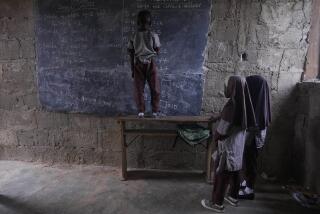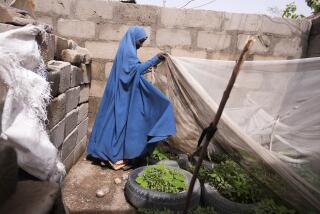Global Development: A specter hangs over Nigeria’s presidential election: Hunger
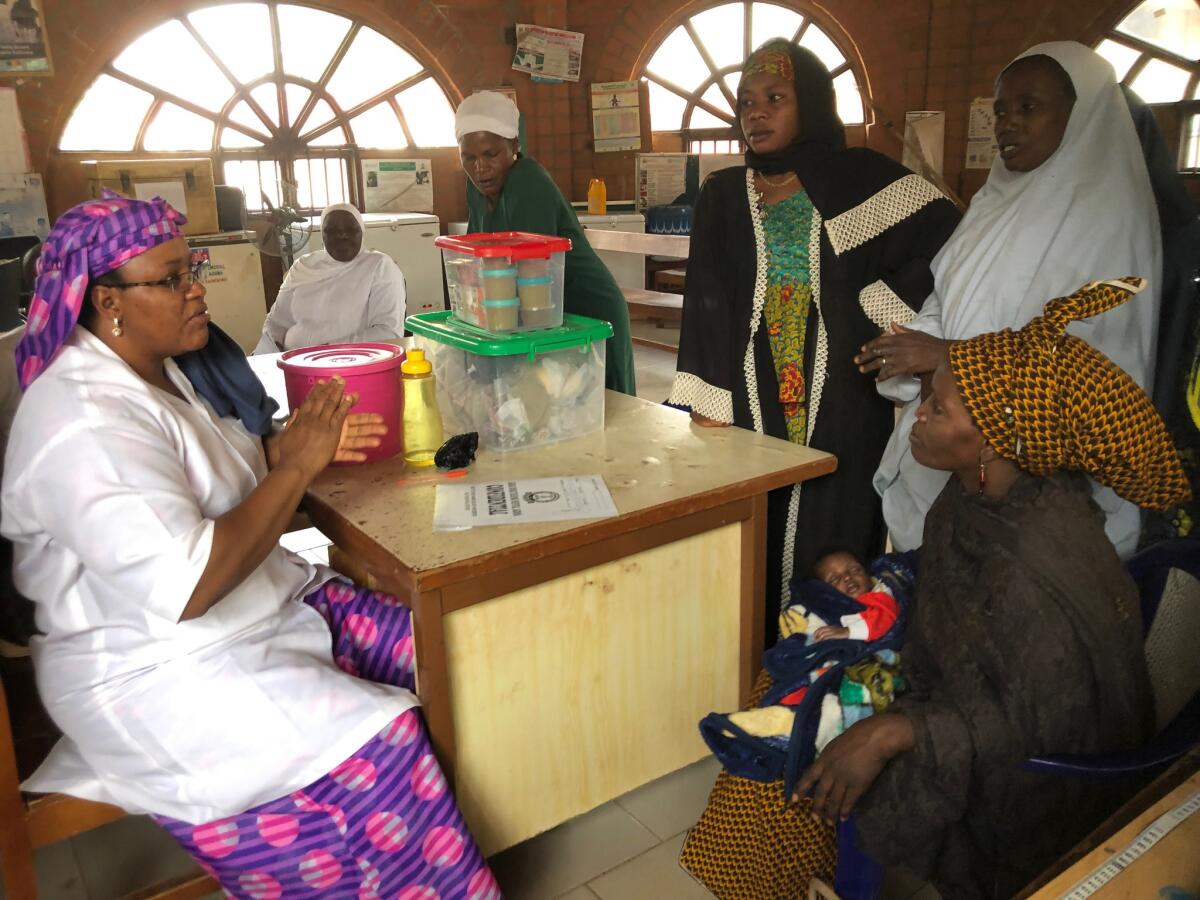
- Share via
Reporting from Kaduna, Nigeria — Salamatu Jibril takes one look at month-old Sufiyan, drowsy under a heavy blanket on a sweaty day in northern Nigeria, and knows there’s a problem.
“The child is 2.7 kilograms [5.9 pounds] and is wasted,” Jibril says, using a term that specialists commonly ascribe to children who don’t weigh enough for their height. “You can see it.”
Sufiyan doesn’t stir, his long fingers resting limply on the blanket. The woman who runs the orphanage where he lives has rushed him to the pediatric unit of Barau Dikko Teaching Hospital in the city of Kaduna.
When a member of the hospital staff lifts him onto a wooden board to be measured, Sufiyan offers a halfhearted stretch, the skin loose around his thighs, and his toes and feet looking too big for his tiny body.
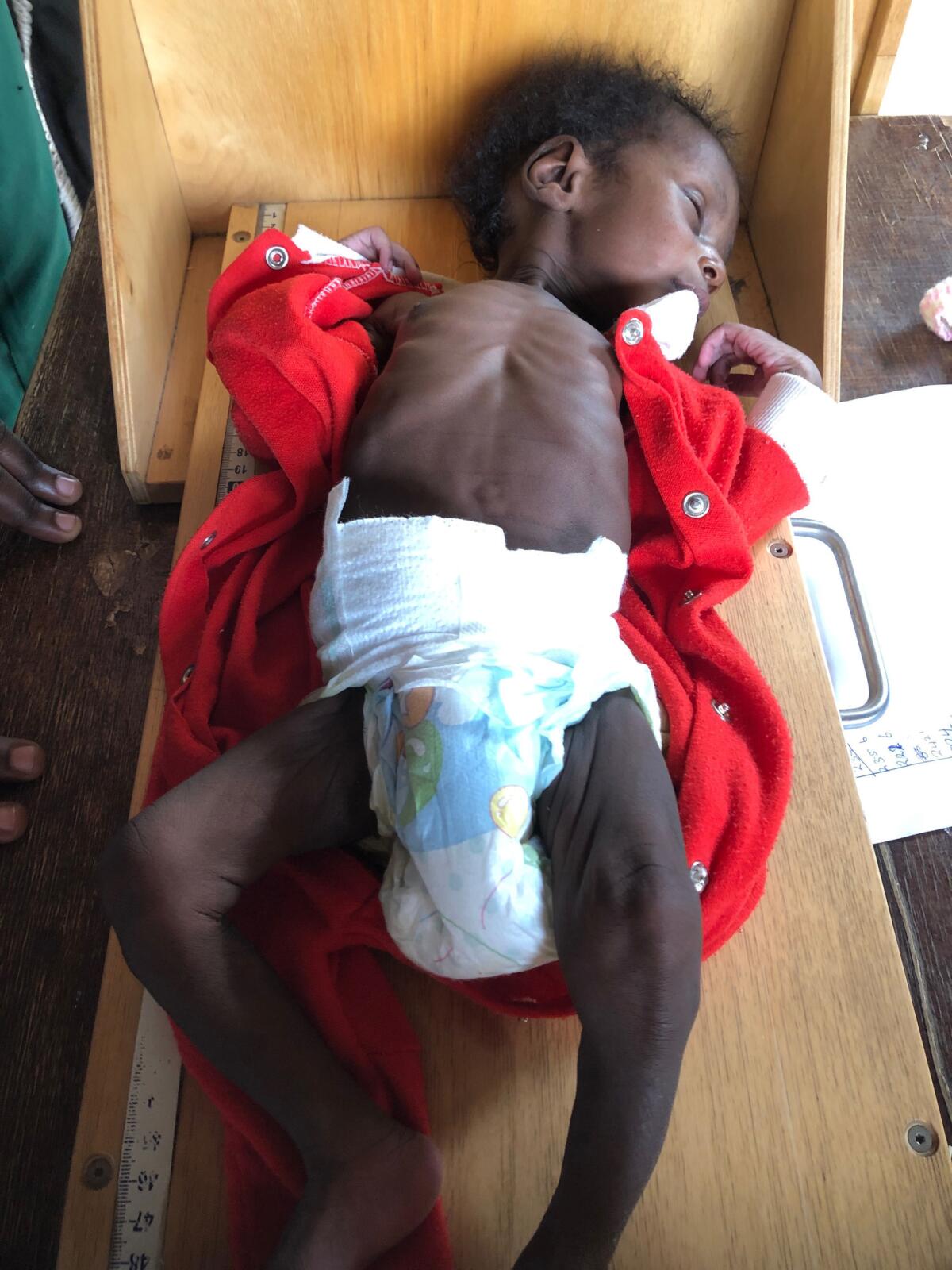
The hospital is the last stop in Kaduna state’s public healthcare system for children who are gravely malnourished. By the time most of the young patients get to nutritionist Jibril and her colleagues, who specialize in stabilizing critically malnourished children, they are dangerously ill.
“If we have 10 patients, we lose four or five,” she says. “We manage [to save] some, and some are gone within hours of coming.”
Nigeria is one of Africa’s economic powerhouses, a crowded, ambitious and oil-rich nation that will go to the polls Feb. 23 in a race that pits former military leader and incumbent President Muhammadu Buhari against opposition leader and businessman Atiku Abubakar. The vote had been set for Saturday, but hours before polls were to open the election commission postponed it a week, citing “challenges” in getting election materials to all parts of the country.
The country vies with South Africa for having the continent’s largest gross domestic product, but, like other resource-rich nations, Africa’s largest oil producer has not managed to spread its wealth around.
Nigeria recently surpassed India as having the most people living in extreme poverty, a worrying development given the fact that its young population of about 200 million is set to double by 2050, making it the third-most populous country in the world.
Those numbers are a source of particular anxiety for people like Jibril who spend their days watching a preventable problem like malnutrition stalk the generation that will shape the future of the country.
About 2.5 million children in Nigeria are acutely malnourished, according to the United Nations, and only 2 out of 10 of those children receive treatment.
“Overall, only 64% of children in Nigeria are growing healthily without being stunted or wasted,” according to the country’s 2018 National Nutrition and Health Survey.
The problem is most severe in the country’s north, far from the flashy cars of Lagos and the oil fields of the southern Niger Delta.
In the troubled northeast, where the Boko Haram insurgency rages on, humanitarian agencies have been steadily ramping up food aid for years to help people displaced and cut off by the conflict.
But poverty cuts across more stable parts of the north as well, affecting families’ ability to make sure their children are getting the food they need.
In Kaduna state, which is north of the capital, Abuja, and is Nigeria’s third-most populous state, more than a third of children are acutely malnourished, the state government says. Even more, 42%, are stunted, showing low height for their age and impaired overall development, according to the health survey.
The gravity of the problem caught the government by surprise when new malnutrition statistics came out three years ago, the state’s permanent secretary for health, Shehu Usman Muhammad, admits.
“It is very alarming, and it’s unacceptable,” he says.
Back then, he says, there were only “sporadic” efforts by the government to track child malnutrition and intervene where problems were observed.
“There was no deliberate plan, so not only did the malnutrition rate grow, but stunting got worse,” he says. “That will have a big impact on the economy and future of the state.”
In 2017, the Kaduna state government, partnering with international donors like UNICEF and Save the Children, rolled out an emergency plan to tackle the complicated problem of why hundreds of thousands of children in the state aren’t eating well enough.
Part of the government’s strategy has been to try to reduce poverty and improve its medical response to malnutrition, such as starting supplementary feeding programs for malnourished children in more clinics.
But a lot of the effort has been about educating families and changing their mindsets, by encouraging exclusive breastfeeding, or dispelling cultural beliefs that sick children have been bewitched and are beyond doctors’ care, or getting families to buy less processed food.
“You see people selling their milk, eggs and chickens to buy instant noodles,” Muhammad says. “We need to change food habits.”
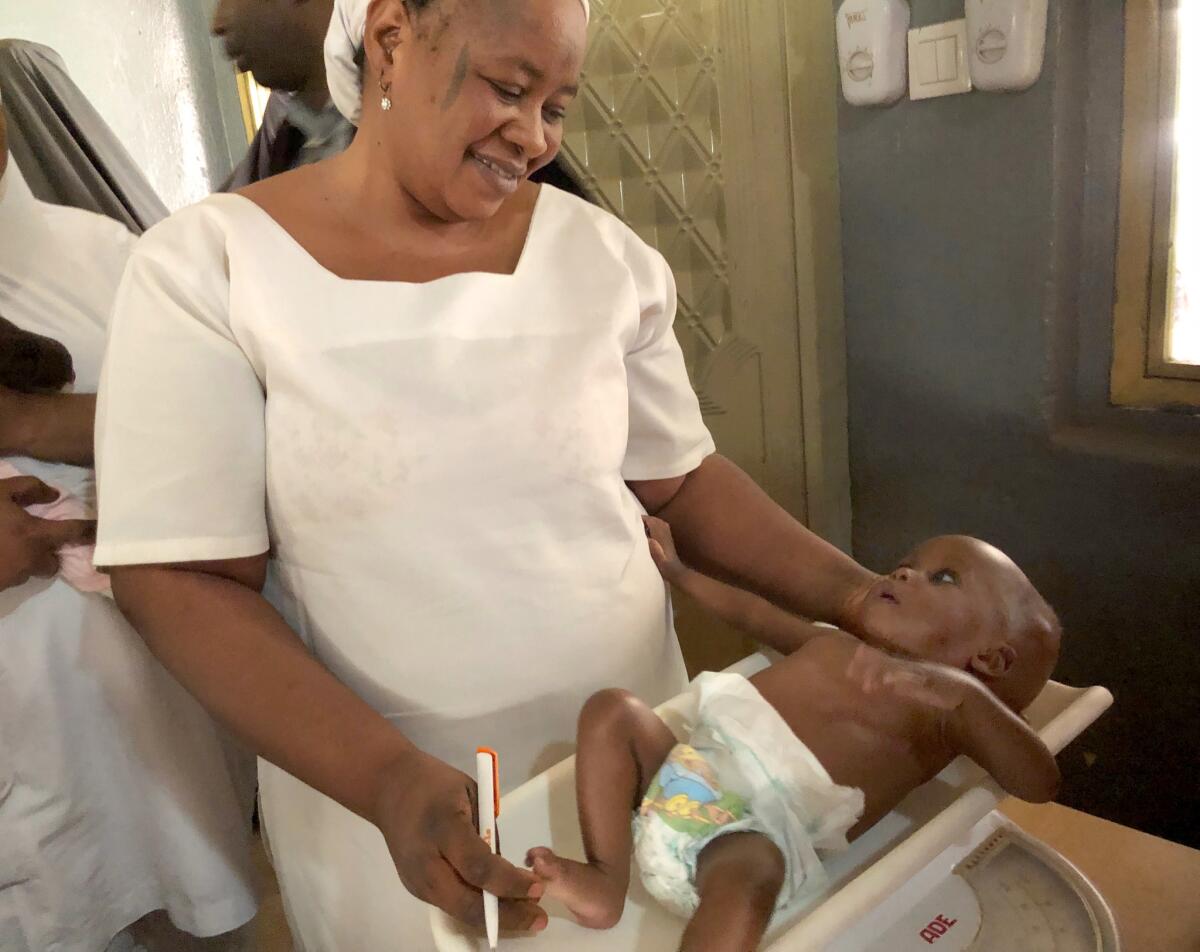
In some places, the plan seems to be working. At the Badarawa primary healthcare center in the city of Kaduna, Amina Adamu, a 27-year-old mother of six, expertly wrestles her youngest son out of his clothes and sets the startled 8-month-old onto a hard plastic scale.
Adamu has been bringing her son here for four weeks, since noticing he wasn’t gaining weight. “I thought it was because he was sucking his thumb,” she says.
This is one of the clinics where the government has trained specialized staffers to work on malnutrition cases. They explained to Adamu how to use better hygiene at home with her children, and they have been giving her son packets of high-calorie supplementary food to eat every day.
Now he’s doing better, Adamu says. “They put me on the right path.”

As the country heads into its national election, both leading presidential candidates have pledged to do more to ease Nigerians’ daily struggles with poverty.
Abubakar has not missed the chance to point out that President Buhari has presided over Nigeria’s rise to being the nation with the most extremely impoverished people, and the opposition leader has said his economic reforms would lift 50 million Nigerians out of poverty in two years.
Buhari, for his part, has used his stump speeches to mention some of the food security programs he’s developed since coming to power in 2015, including a school feeding program that the government says reaches more than 9 million children.
But tackling complex public health problems like malnutrition has not been at the heart of the battle for votes. And critics say the existing local and national efforts to address malnutrition are too patchy to have broad impact.
“Having policies is different from implementing them,” says Andy Bako Byeing, executive director of the Bako Youth Development Foundation, which helps families struggling with child malnutrition in Kaduna.
“We have the resources to make life better for everybody in this country,” he says. “Now we are the poverty headquarters of the world. Who knows where we’ll be if things don’t change?”
At the Barau Dikko Teaching Hospital, the staff worries it does not have what it needs to deal with the scale of the problem.
In the pediatric intensive care unit, several babies lie on a padded communal table, IV drips hanging above their heads on a metal rack. Most of the children in this room are sick in part because they’re malnourished, the staff says.
One child lies on a blanket, wrapped in a light-blue cardigan with his arms splayed out on either side. He appears to be barely conscious, and now and then shudders with the effort to breathe, despite the help of an oxygen tube.
This hospital is the final hope for these patients and their families. But, says Abdulkadir Musa Tabari, the hospital’s chief medical director, “given the number of children we see, it’s certainly inadequate.”
Jibril, the nutritionist, says her ward needs more staff and training and a real kitchen to cook meals. Right now, she says, she can’t even afford to call parents after they’ve left to make sure they continue to give the right care to their recovering children.
After long, expensive stays in the hospital, many families don’t want to go back to see more doctors at home, fearing more draining medical bills.
“The moment they will be discharged,” she says, “they run away.”
For now, Sufiyan appears to have a chance of getting better.
He doesn’t have to be admitted, at least. Cecilia Tambaya, who is in charge of him and 30 more babies at a nearby orphanage, nods as Jibril suggests different types of formula she can try to give him.
And she promises to bring him back in two weeks.
Mahr is a special correspondent.
More to Read
Sign up for Essential California
The most important California stories and recommendations in your inbox every morning.
You may occasionally receive promotional content from the Los Angeles Times.

